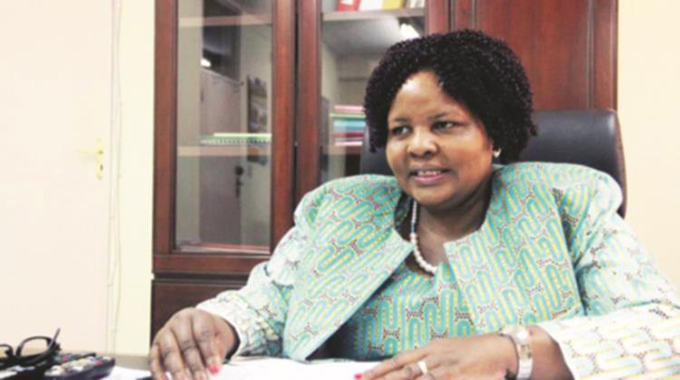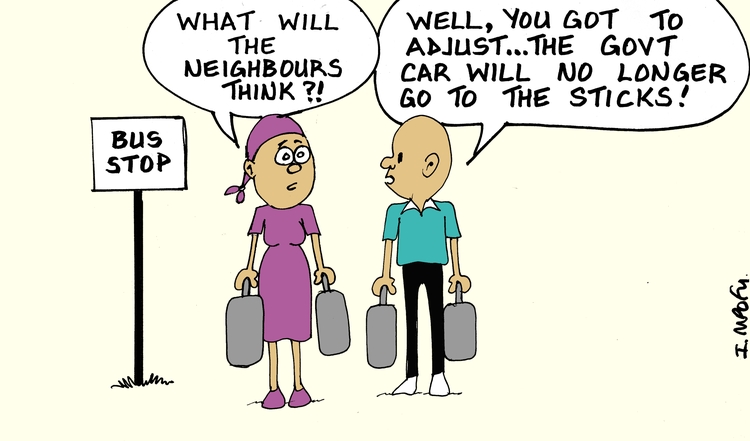Devolution: Manicaland to hit the ground running

Tendai Mugabe
Government will soon roll out the concept of devolution in line with provisions of the Constitution. On Tuesday last week, Cabinet approved principles of the Provincial Councils and Administration (Amendment) Bill which spells out the mechanisms of decentralisation and devolution. Our Senior Reporter Tendai Mugabe (TM) last week got in touch with Minister of State for Manicaland Province Dr Ellen Gwaradzimba (EG) to assess the preparedness of the province to implement devolution. Read on . . .
TM: How ready are you as Manicaland province to implement the concept of devolution?
EG: Manicaland is more than ready and has always been ready for the devolution. I think the idea of devolution is not a new thing at all. Ever since we started the constitution-making process it was one of the topical issues under discussion.
It has been one of the wishes of the people, not just of Manicaland, but in Zimbabwe as a whole that decentralisation of power and authority from central Government to the provinces will produce efficiency and effectiveness in terms of both economic, political and social growth.
Why do I say we are ready as Manicaland? We have already established sectoral clusters where we are saying the experts in agriculture group together and come up with a development agenda in that area, the experts in forestry, experts in tourism, mining, education and social welfare come together and come up with a development agenda for Manicaland.
We have all what it takes to be a great province. We are endowed with natural endowments in every district which include minerals almost in all districts. We have gold, diamonds and other minerals in Manicaland.
Besides the gemmology centre, we had a workshop where we were discussing the need to promote and support artisanal miners. Gone are the days when we labelled our own youths, women and men as illegal gold panners.
The fact that there are so many of them engaged in this illegal gold panning it means they see an opportunity for growth. We want to increase our mining by legalising and regularising the operations so that it is done in an orderly fashion.
This requires support in terms of financial, in terms of the equipment, to do the mining and Metropolitan Bank is a partner in that regard and the Confederation of Mining Organisations in Manicaland is spearheading that. We have been looking for investors, both local and international, to come and partner with us.
We have a team from Belarus, who are doing alluvial gold mining in Penhalonga and we are also supporting Redwing Mine, which has recently been facing challenges with capitalisation, but we are intervening and supporting them so that we keep them on board as one of our biggest gold mines in Manicaland.
Then we go to tourism, which is one of our greatest strengths in terms of economic development. We have got mountains, Nyanga, very scenic views all over in Manicaland. Actually every district has tourist attraction centres. We have water bodies where we can promote agriculture through irrigation. We can actually harvest water and increase our dams in Manicaland.
The elections of provincial councillors have already been done. They are in place. What we have been waiting for is the blueprint or the framework that guides the operations of the provincial councils. So we are more than ready. Now that Parliament has approved the operation of the provincial councils it means we are ready to start work in earnest.
TM: In terms of specific projects in line with devolution, may you highlight and explain some of the key projects you think may help your province to prosper.
EG: Manicaland is in the process of setting up a gemmology centre where we are going to be doing the polishing and value addition to our diamonds and other minerals in the province. Very soon we are going to do the ground- breaking ceremony in Fern Valley near the Manicaland State University.
That is where the School of Mines in Bulawayo is going to set up the gemmology centre. The funds have been made available, the space is there and what is left now is the ground-breaking ceremony. It is going to be almost like a university in terms of operations and it is not going to be limited to diamonds, but all minerals that are of value in Manicaland.
In the education sector, we have got the Manicaland State University of Applied Sciences that is underway.
The project has been on the cards, started on a small scale in conjunction with Midlands State University and we are saying it’s high time Manicaland State University of Applied Sciences stands on its own.
All the other provinces have State universities and we are saying we need a State university of our own. We have set up a steering committee that is going to push on the establishment of this outstanding institution of higher learning in Manicaland.
We are adopting the satellite centre approach where we are not going to have a high concentration of students at one place, but the satellite centres are going to focus on specialisation where the centre in Chipinge will look at horticulture, then in Nyanga we are going to have the school of medicine, in Makoni we are going to have the school of agriculture and the Fern Valley campus will have science and engineering.
In the area of ICT and trade, we are busy preparing for a Smart City Summit to be held on 30 November 2018. The Smart City concept is an approach that has been established worldwide where we are going to talk about development using smart technologies.
This summit is going to be the first of its kind in Zimbabwe and we are inviting His Excellency the President and all the other business practitioners and economists, where we are saying come, let’s put our heads together and see how we can embrace technology in building our economies. Prominent speakers have been lined up to give addresses that are related to technology and development.
In terms of tourism, we have lined up a number activities to promote tourism. It has declined over the years, but we are saying as we grow our economy it’s one area where we want to put our energies.
We have the infrastructure in terms of hotels, some of which have been abandoned and we want to resuscitate them and promote tourism through youth and women.
We also want to promote domestic tourism. I went to China on an exchange programme and learnt a lot on how they value and promote domestic tourism.
We have tourist attraction centres throughout the province and we are saying it is a very simple way of raising income, with local people coming to know our country better rather than having foreigners know our country better than us.
We need to up the game in tourism and that includes upgrading of roads because most roads are not passable at the moment.
We want to ensure that part of the infrastructure development includes accommodation for the tourists, the preservation of the tourist attraction centres and improvement of the road network.
Agriculture – there are various schemes underway by Government to support farmers, but we are going further to look for partners who are partnering our local farmers so that they can provide the much needed capital for farming activities in order for us to fully utilise the land.
Currently, we have land which is lying idle because of financial challenges that the farmers are facing. So, we want to up the farming activities and those activities are not limited to agriculture.
There is Command Livestock, Command Poultry and Command Fishery (etc). We are putting our communities in groups in order for them to access those facilities.
With regards to tobacco farming, we are advocating for the establishment of tobacco auction floors here in Manicaland and this is in line with devolution.
We are saying instead of the hassles that our farmers have been experiencing going to Harare, why not do that auctioning here in Manicaland – taking the services and facilities to where the people are. Then value addition is an area we are focusing.
We are the hub of timber here in Manicaland. We have illegal settlers in the timber plantations that have promoted timber poaching and causing of fires that have been destroying our timber which is a very valuable resource to Manicaland.
We are saying we need to remove those and make sure that they are settled elsewhere so that our forests are safe and we do the harvesting, value addition again in an organised fashion.
We have fruits in Nyanga. Why do we continue to buy fruit juice and other products from South Africa and elsewhere and not do the value addition by establishing factories to make our own juice and other products coming from these fruits?
We have macadamia nuts, avocados, tea and coffee in Chipinge and we need to add value to these products. There is a macadamia plant for processing the macadamia nuts and coffee and right now it’s not operational.
This is one project that we are also targeting as we devolve all the activities and wealth creation to Manicaland.
TM: This is the first time Government is implementing devolution. Are there any areas that you think the central Government should assist you?
EG: Areas that we may need support, I think it will be areas like space, office accommodation to accommodate the provincial council.
Obviously, there is going to be a hive of activity because of the decentralisation. Since everything is going to be done at provincial level, we will require a lot of office space and we expect that the Government is going to give us support in that regard.
Right now we are facing a shortage and I was actually wondering where I am going to house the provincial council because we don’t have sufficient space.
Also capacity building in terms of roles clarification, and also training. People need to be educated as to what exactly devolution is all about so that they are prepared and embrace the concept that Government is trying to promote in order to empower the provinces to be in control of their own development.
There is a lot of education that is required because obviously we are going to see the promotion of a new work ethic because we will be in competition with other provinces and we want to be on the top as Manicaland.
We have all what it takes, including the human capital and natural endowments and what is required is the education so that all of us embrace devolution.
It is not only limited to Government, but also ropes in the private sector, local authorities and traditional leadership – it’s all inclusive so that we have a common vision that we share.
We need facilitators who will help us in coming up with strategic plans at district level, so there will be consultations from district level that will feed into the provincial development plan.
With regards to investment, we are saying its important to quicken processes of engaging investors. We are saying Zimbabwe is open for business and we don’t want the old approach where there was red tape and bureaucratic processes that take forever.
That has been frustrating. This time around we want to do things differently. It is the Government that is going to assist us by setting up systems that are efficient and responsive to the needs of both local and foreign investors, otherwise all the efforts the President has been making with come to naught and this whole idea of devolution will not work.
TM: Since you came into office, what has been the response from investors you have been engaging?
EG: My office is inundated with inquiries from investors. Foreign investors coming from all over the world and the locals also.
They have registered their interest to invest in Manicaland. Manicaland is hot at the moment. I don’t know, probably we are the richest province in the country because in terms of agriculture we have all the five climatic regions, so we can do everything related to agricultural production.
We have a database of investors that we have created who have expressed interest. And not to forget the Diaspora investors – our children in the Diaspora.
They are keen to invest back home and they are sending representatives in early December to have a conversation with me as to the areas that they can invest in. We want to harness and mobilise all our people to come and invest in Manicaland.
The other issue we are looking at is urban renewal inasfar as housing development is concerned, as well as establishing towns.
What we are saying is that towns should now expand into cities and the growth points also develop into towns and service centres develop in growth points.
We are looking not just at urbanisation, but to go with that we are looking at modernisation. We want state-of-the-art facilities, be they buildings, schools, hospitals, transport, everything must be world class this time around).
That is the middle income status that we are looking at by 2030. Give us five years and you will see wonders from Manicaland. Mutare will be a glittering city, the diamond city, and we are ready to hit the ground running.









Comments